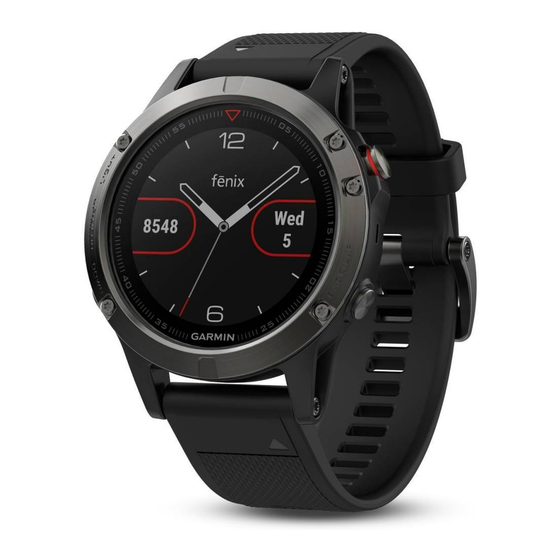Garmin D2 CHARLIE Manuel du propriétaire - Page 22
Parcourez en ligne ou téléchargez le pdf Manuel du propriétaire pour {nom_de_la_catégorie} Garmin D2 CHARLIE. Garmin D2 CHARLIE 48 pages.

your running or riding ability
page
14).
Viewing Your Performance Condition
This feature requires wrist-based heart rate or a compatible
chest heart rate monitor.
1
Add Perform. Cond. to a data screen
Screens, page
25).
2
Go for a run or ride.
After 6 to 20 minutes, your performance condition appears.
3
Scroll to the data screen to view your performance condition
throughout the run or ride.
Lactate Threshold
Lactate threshold is the exercise intensity at which lactate (lactic
acid) starts to accumulate in the bloodstream. In running, it is
the estimated level of effort or pace. When a runner exceeds the
threshold, fatigue starts to increase at an accelerating rate. For
experienced runners, the threshold occurs at approximately 90%
of their maximum heart rate and between 10k and half-marathon
race pace. For average runners, the lactate threshold often
occurs well below 90% of maximum heart rate. Knowing your
lactate threshold can help you determine how hard to train or
when to push yourself during a race.
If you already know your lactate threshold heart rate value, you
can enter it in your user profile settings
Zones, page
17).
Performing a Guided Test to Determine Your Lactate
Threshold
This feature requires a Garmin chest heart rate monitor. Before
you can perform the guided test, you must put on a heart rate
monitor and pair it with your device
Sensors, page
31).
The device uses your user profile information from the initial
setup and your VO2 max. estimate to estimate your lactate
threshold. The device will automatically detect your lactate
threshold during runs at a steady, high intensity with heart rate.
TIP: The device requires a few runs with a chest heart rate
monitor to get an accurate maximum heart rate value and VO2
max. estimate. If you are having trouble getting a lactate
threshold estimate, try manually lowering your maximum heart
rate value.
1
From the watch face, select
2
Select an outdoor running activity.
GPS is required to complete the test.
3
Hold UP.
4
Select Training > Lactate Threshold Guided Test.
5
Start the timer, and follow the on-screen instructions.
After you begin your run, the device displays each step
duration, the target, and current heart rate data. A message
appears when the test is complete.
6
After you complete the guided test, stop the timer and save
the activity.
If this is your first lactate threshold estimate, the device
prompts you to update your heart rate zones based on your
lactate threshold heart rate. For each additional lactate
threshold estimate, the device prompts you to accept or
decline the estimate.
Getting Your FTP Estimate
Before you can get your functional threshold power (FTP)
estimate, you must pair a chest heart rate monitor and power
meter with your device
(Pairing Your Wireless Sensors,
page
31), and you must get your VO2 max. estimate
Your VO2 Max. Estimate for Cycling, page
The device uses your user profile information from the initial
setup and your VO2 max. estimate to estimate your FTP. The
16
(About VO2 Max. Estimates,
(Customizing the Data
(Setting Your Heart Rate
(Pairing Your Wireless
.
(Getting
14).
device will automatically detect your FTP during rides at a
steady, high intensity with heart rate and power.
1
Select UP or DOWN to view the performance widget.
2
Select
to scroll through the performance measurements.
Your FTP estimate appears as a value measured in watts per
kilogram, your power output in watts, and a position on the
color gauge.
Purple
Blue
Green
Orange
Red
For more information, see the appendix
page
39).
NOTE: When a performance notification alerts you to a new
FTP, you can select Accept to save the new FTP, or Decline
to keep your current FTP
Notifications, page
13).
Conducting an FTP Test
Before you can conduct a test to determine your functional
threshold power (FTP), you must pair a chest heart rate monitor
and a power meter with your device
Sensors, page
31), and you must get your VO2 max. estimate
(Getting Your VO2 Max. Estimate for Cycling, page
NOTE: The FTP test is a challenging workout that takes about
30 minutes to complete. Choose a practical and mostly flat route
that allows you to ride at a steadily increasing effort, similar to a
time trial.
1
From the watch face, select
2
Select a cycling activity.
3
Hold UP.
4
Select Training > FTP Guided Test.
5
Follow the on-screen instructions.
After you begin your ride, the device displays each step
duration, the target, and current power data. A message
appears when the test is complete.
6
After you complete the guided test, complete the cool down,
stop the timer, and save the activity.
Your FTP appears as a value measured in watts per
kilogram, your power output in watts, and a position on the
color gauge.
7
Select an option:
• Select Accept to save the new FTP.
• Select Decline to keep your current FTP.
Training
Setting Up Your User Profile
You can update your gender, birth year, height, weight, heart
rate zone, and power zone settings. The device uses this
information to calculate accurate training data.
1
Hold UP.
2
Select Settings > User Profile.
3
Select an option.
Fitness Goals
Knowing your heart rate zones can help you measure and
improve your fitness by understanding and applying these
principles.
• Your heart rate is a good measure of exercise intensity.
Superior
Excellent
Good
Fair
Untrained
(FTP Ratings,
(Turning Off Performance
(Pairing Your Wireless
14).
.
Training
